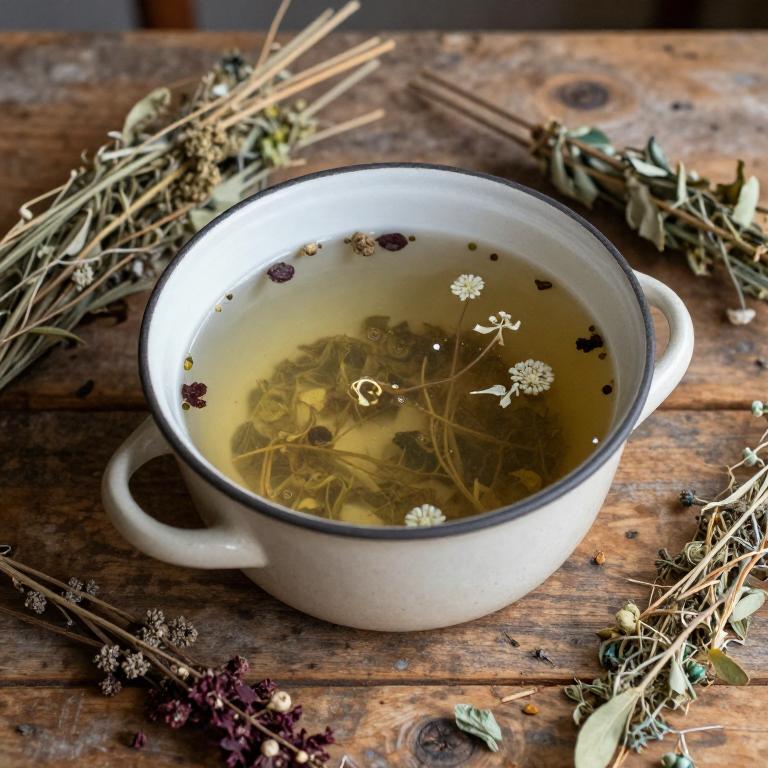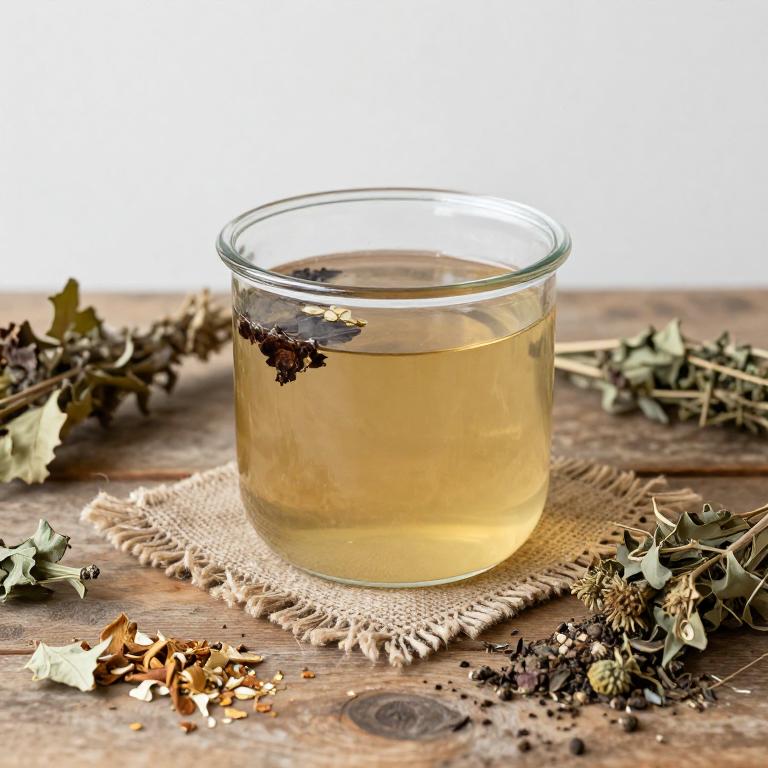10 Best Herbal Decoctions For Bad Breath

Herbal decoctions have been traditionally used to address bad breath by promoting oral hygiene and balancing the body's internal environment.
Common herbs such as fennel, peppermint, and licorice root are often included in these decoctions for their antimicrobial and freshening properties. To prepare a herbal decoction, the selected herbs are boiled in water for several minutes, then strained and consumed as a tea or used as a mouth rinse. These natural remedies are believed to help reduce bacteria in the mouth and support digestive health, which can contribute to improved breath.
While herbal decoctions can be effective, it is important to consult with a healthcare professional to ensure they are safe and appropriate for individual health conditions.
Table of Contents
- 1. Peppermint (Mentha piperita)
- 2. Black pepper (Piper nigrum)
- 3. Licorice (Glycyrrhiza glabra)
- 4. Ceylon cinnamon (Cinnamomum verum)
- 5. Salvia (Salvia officinalis)
- 6. Rosemary (Rosmarinus officinalis)
- 7. Fennel (Foeniculum vulgare)
- 8. Oregano (Origanum vulgare)
- 9. Cumin (Cuminum cyminum)
- 10. Ginger (Zingiber officinale)
1. Peppermint (Mentha piperita)

Mentha piperita, commonly known as peppermint, is a popular herb used in herbal decoctions to address bad breath due to its refreshing and antimicrobial properties.
When prepared as a decoction, peppermint leaves are simmered in water to release essential oils that help neutralize oral bacteria and reduce odor-causing compounds. This natural remedy is particularly effective for temporary relief of halitosis caused by mild digestive issues or poor oral hygiene. The cooling and stimulating effects of peppermint also promote saliva production, which further aids in cleansing the mouth.
While it is generally safe for most people, individuals with certain medical conditions or allergies should consult a healthcare professional before using peppermint decoctions regularly.
2. Black pepper (Piper nigrum)

Piper nigrum, commonly known as black pepper, has been traditionally used in herbal medicine for its potential benefits in improving oral health.
Herbal decoctions made from black pepper are believed to help reduce bad breath by stimulating saliva production, which naturally cleanses the mouth. The active compound piperine in black pepper may have antimicrobial properties that inhibit the growth of bacteria responsible for halitosis. When prepared as a decoction, black pepper can be used as a natural remedy to freshen breath and support overall dental hygiene.
However, it is important to consult with a healthcare provider before using it, especially for individuals with existing health conditions or those taking medications.
3. Licorice (Glycyrrhiza glabra)

Glycyrrhiza glabra, commonly known as licorice root, has been traditionally used in herbal medicine for its potential benefits in addressing bad breath.
The herbal decoction of licorice root is believed to possess antimicrobial properties that can help reduce the bacterial load in the oral cavity, which is a common cause of halitosis. When prepared as a decoction, licorice root is typically simmered in water to extract its active compounds, such as glycyrrhizin and flavonoids, which may support oral health. Some studies suggest that licorice root may help soothe inflamed gums and promote a balanced oral microbiome.
However, it is important to consult with a healthcare provider before using licorice root decoctions, as excessive consumption can lead to side effects like hypertension or water retention.
4. Ceylon cinnamon (Cinnamomum verum)

Cinnamomum verum, commonly known as true cinnamon, has been traditionally used in herbal medicine for its aromatic and antimicrobial properties.
When prepared as a decoction, it involves simmering the bark in water to extract its essential oils and active compounds. This herbal remedy is believed to help combat bad breath by reducing oral bacteria that contribute to unpleasant odors. The essential oils in cinnamon, such as cinnamaldehyde, possess antibacterial and antifungal effects that can freshen the mouth.
Regular use of cinnamon decoctions may support overall oral hygiene and provide a natural alternative for managing halitosis.
5. Salvia (Salvia officinalis)

Salvia officinalis, commonly known as sage, has been traditionally used for its medicinal properties, including its ability to combat bad breath.
Herbal decoctions made from sage leaves are prepared by steeping the dried leaves in hot water, allowing the essential oils and phytochemicals to infuse into the liquid. These decoctions are believed to reduce oral bacteria that contribute to halitosis, thereby freshening the breath naturally. Sage contains compounds like thujone and cineole, which have antimicrobial and anti-inflammatory effects.
Regular use of sage decoctions can be a safe and effective alternative to commercial mouthwashes, offering both therapeutic and aromatic benefits for oral health.
6. Rosemary (Rosmarinus officinalis)

Rosmarinus officinalis, commonly known as rosemary, has been traditionally used in herbal medicine for its aromatic and therapeutic properties.
Rosemary herbal decoctions are prepared by simmering the dried leaves in water, creating a potent infusion rich in essential oils and antioxidants. These decoctions are believed to help combat bad breath by stimulating saliva production and neutralizing oral bacteria. The active compounds in rosemary, such as rosmarinic acid and cineole, possess antimicrobial and anti-inflammatory effects that support oral health.
Regular consumption of rosemary decoctions may contribute to fresh breath and overall digestive wellness.
7. Fennel (Foeniculum vulgare)

Foeniculum vulgare, commonly known as fennel, has been traditionally used in herbal medicine for its potential benefits in addressing bad breath.
The herb contains volatile oils, such as anethol and fenchone, which possess antimicrobial properties that may help reduce oral bacteria responsible for odor. A fennel herbal decoction can be prepared by steeping the dried seeds in hot water, creating a soothing and aromatic tea. This decoction is often recommended for its ability to freshen breath and support digestive health, which can indirectly improve oral hygiene.
Regular consumption of fennel decoctions may offer a natural and holistic approach to managing persistent bad breath.
8. Oregano (Origanum vulgare)

Oregano (Origanum vulgare) is a commonly used herb in traditional medicine, and its herbal decoctions have been historically valued for their potential to combat bad breath.
The plant contains essential oils, particularly carvacrol and thymol, which possess antimicrobial properties that can help reduce the bacteria responsible for halitosis. To prepare an oregano decoction, fresh or dried leaves are boiled in water, allowing the active compounds to infuse into the liquid. This decoction can be used as a mouth rinse or consumed in small quantities to promote oral hygiene.
While oregano may offer some natural relief for bad breath, it is important to consult a healthcare professional for persistent or severe cases, as underlying conditions may require more comprehensive treatment.
9. Cumin (Cuminum cyminum)

Cuminum cyminum, commonly known as cumin, has been traditionally used in herbal medicine for its various health benefits, including its potential to combat bad breath.
The essential oils found in cumin seeds, such as limonene and caryophyllene, possess antimicrobial properties that can help reduce the bacteria responsible for oral malodor. A cumin herbal decoction can be prepared by boiling the seeds in water, allowing the active compounds to be released into the liquid. This decoction can be used as a natural mouth rinse or added to oral care routines to freshen breath.
While cumin is generally safe for most people, it is advisable to consult a healthcare professional before using it as a treatment for persistent bad breath.
10. Ginger (Zingiber officinale)

Zingiber officinale, commonly known as ginger, has been traditionally used in herbal medicine for its various therapeutic properties, including its ability to combat bad breath.
Ginger contains essential oils and phytochemicals that help neutralize oral bacteria, reducing the formation of volatile sulfur compounds responsible for unpleasant odors. A ginger herbal decoction can be prepared by simmering fresh or dried ginger root in water, allowing the active compounds to infuse into the liquid. This natural remedy is not only effective in freshening breath but also offers additional benefits such as aiding digestion and reducing inflammation.
When used regularly, ginger decoctions can serve as a safe and effective alternative to commercial mouthwashes for maintaining fresh breath and oral hygiene.